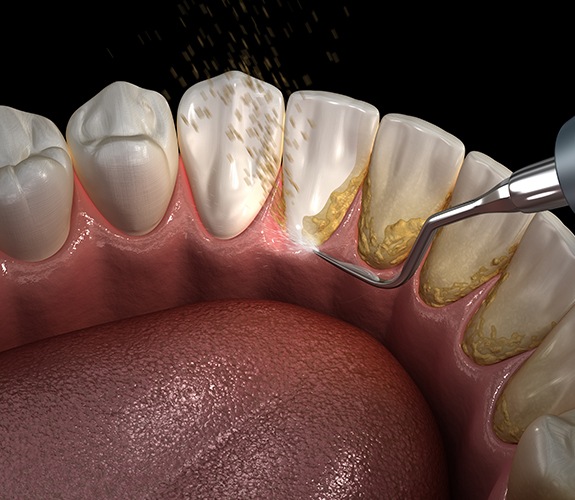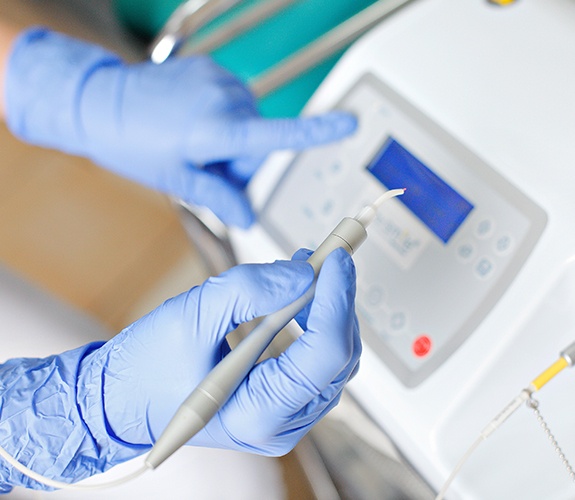
Gum Disease Treatment – Lake Zurich, IL
State-of-the-Art Solutions for Gum Disease
Nearly half of all adults in the United States suffer from gum disease in one form or another, and when left unchecked it can cause you to suffer tooth loss – and might even contribute to heart disease and other health issues! If we find signs of gum disease during your checkups, we can intervene and treat it early before it becomes truly damaging. Learn more about gum disease treatment in Lake Zurich, IL on this page.
Why Choose Grand Dental - Lake Zurich for Gum Disease Treatment?
- Soft-Tissue Laser Technology
- Fully Customized Treatments
- In-House, Certified Periodontist
Scaling & Root Planing

Getting rid of the bacteria that causes gum disease requires a deep cleaning procedure. The first step is to remove all plaque and tartar from the teeth, including the space beneath the gum line. Afterwards, the tooth roots are smoothed out to give the gum tissue a chance to reattach itself.
Soft Tissue Laser Dentistry

Dental lasers have multiple applications in fighting gum disease. They remove the infected tissue while also sterilizing the area as it goes along, killing any bacteria that might remain. The technology also reduces recovery time since it keeps bleeding to a minimum and doesn’t remove more tissue than is actually necessary.
Advanced Periodontal Procedures

With two in-house periodontists, we’re capable of treating even complex periodontal cases. In the event that you need a gum graft or another type of gum surgery, you can look forward to having it performed by a team you already know and trust in an environment that you’re familiar with.
Periodontal FAQs

Millions of people in the United States are affected by gum diseases but are not completely familiar with the warning signs or the proper steps to take to have the condition properly addressed. Our team at Grand Dental – Lake Zurich is here to answer any questions you might have about periodontal health as well as your options for treatment. The following questions cover topics that patients often ask in relation to gum disease.
How Can I Avoid Gum Disease?
Gum disease is a highly preventable oral health issue. One way to avoid it is to practice optimal oral hygiene. This means brushing and flossing at least two times every day, paying close attention to the gum line and the hard-to-reach spaces between the teeth. An ADA-approved mouthwash can also help reduce the presence of the bacteria that cause gum disease. Also, switching out sugars and starches for leafy greens, fruits, vegetables, and other healthy foods can help significantly improve gum health. Our team can examine your gums during your six-month checkups to check for signs of gum disease before it reaches its most severe stages.
Does Gum Disease Therapy Hurt?
There is very little discomfort associated with gum disease treatments. Before certain procedures, the gums will be numbed with local anesthesia, meaning you will not feel pain during the treatment. After the procedure, you may notice some soreness, which can be relieved with over the counter pain medication. Other treatments may not even require the local anesthesia; laser periodontal therapy, for example, is noted to be extremely gentle, can be performed with little preparation, and requires much less time to recover from afterwards.
What If My Teeth Can’t Be Saved?
At the most advanced stages of gum disease, the teeth may start to come loose as a result of the tissues holding them in place becoming damaged. It can be very difficult to try and save the teeth once the disease has already reached this point, so in many cases an extraction is left as the only option for protecting long-term oral health. After the teeth have been removed, our team can go over the available options for filling in the empty space. Dentures, dental bridges, or dental implants may be recommended based on the number of teeth missing and the current health of the jawbone.
Does Dental Insurance Cover Gum Disease Therapy?
While the services covered by dental insurance tends to vary depending on what carrier is being used, most of the time periodontal therapy is included. Patients should review their insurance plans to confirm that treatment for gum disease is included. Coverage can be anywhere between 50% and 80% depending on whether the insurance company considers the treatment to be a minor procedure or a major one. It is important to remember that individuals need to have already met their annual deductible before their plan will pay for anything. Also, the annual maximum – the limit on how much an insurance company will pay for dental care during the year – will need to be considered.